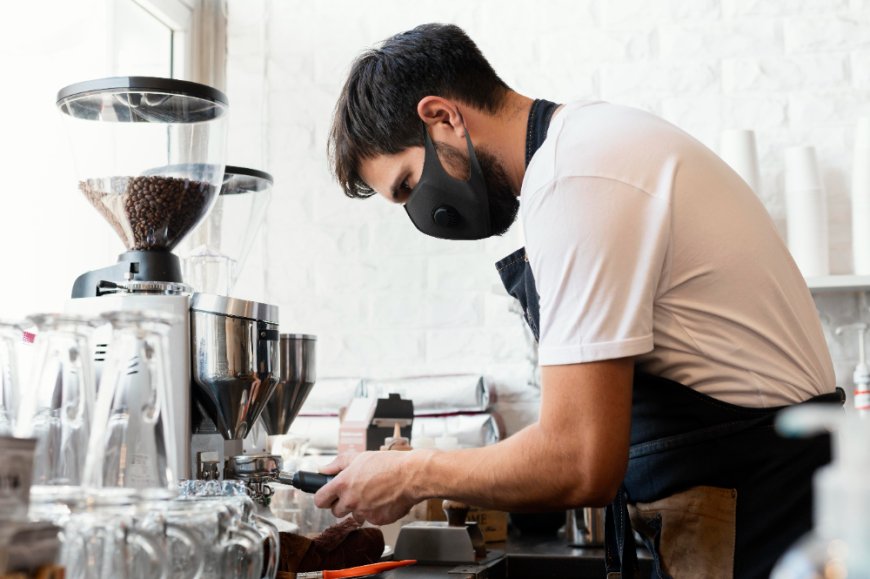Master the Art of Coffee with Barista Training
In the world of coffee, mastering the craft of creating exceptional drinks is both an art and a science.

In the world of coffee, mastering the craft of creating exceptional drinks is both an art and a science. Whether you're starting your career as a barista, looking to sharpen your existing skills, or simply passionate about brewing the perfect cup at home, barista training provides the tools and knowledge to excel. This guide explores the essentials of barista training, the skills you can expect to learn, and how it can help you master the art of coffee preparation.
Why Barista Training Matters
Barista training goes beyond making coffee; it focuses on precision, consistency, and creativity. With formal training, you gain an in-depth understanding of coffee’s complexities, from the beans to the brewing process, ensuring every cup meets the highest standards.
Barista training is ideal for:
-
Aspiring professionals aiming to enter the coffee industry with confidence.
-
Experienced baristas looking to refine their skills and explore specialty methods.
-
Coffee lovers who want to brew cafe-quality coffee at home.
Key Skills You Gain in Barista Training
Barista training covers both practical and theoretical aspects of coffee making. Here are the essential skills you can expect to learn:
1. Espresso Brewing
A perfect espresso is the foundation of most coffee drinks. Barista training teaches you to adjust grind size, brewing time, and tamping pressure to achieve balanced and flavorful shots.
2. Milk Frothing Techniques
Learn to steam milk to the right temperature and texture for drinks like cappuccinos, lattes, and flat whites. Achieving silky microfoam is essential for quality results.
3. Latte Art
Beyond taste, presentation plays a major role in coffee preparation. Barista training covers basic and advanced latte art techniques to create beautiful patterns like hearts, rosettas, and more.
4. Coffee Bean Knowledge
Understanding coffee origins, roasting profiles, and flavor notes helps you identify the best beans for different brewing methods and customer preferences.
5. Manual Brewing Methods
Gain experience with alternative brewing techniques, such as pour-over, French press, Aeropress, and siphon brewing, to expand your coffee repertoire.
6. Equipment Care and Maintenance
Proper maintenance of espresso machines, grinders, and brewing equipment ensures consistency and extends the life of your tools.
7. Customer Service
Customer experience is just as important as coffee quality. Training often includes soft skills, like managing orders efficiently and engaging with customers in a positive way.
Types of Barista Training Programs
Barista training comes in different formats, depending on your needs and experience level:
1. Beginner Barista Courses
These programs focus on foundational skills, including espresso extraction, milk steaming, and basic latte art.
2. Intermediate and Advanced Courses
For baristas with some experience, advanced classes refine techniques and introduce specialty coffee practices, such as manual brewing and advanced latte art.
3. Specialty Coffee Programs
Specialty courses provide a deeper dive into topics like cupping, coffee science, and understanding complex flavor profiles.
4. Online Barista Training
If in-person classes aren’t an option, online training programs offer flexibility with video tutorials and step-by-step guides.
How to Find the Right Barista Training Program
When choosing a barista training course, consider these factors:
-
Accreditation: Programs accredited by organizations like the Specialty Coffee Association (SCA) are widely recognized in the coffee industry.
-
Course Content: Look for courses that align with your goals, whether it’s learning the basics or mastering advanced techniques.
-
Practical Training: Hands-on practice with real equipment is essential for building confidence and skill.
-
Instructor Experience: Choose programs led by experienced baristas or coffee industry professionals.
-
Location and Format: Decide whether in-person training or online learning suits your schedule and budget.
-
Class Size: Smaller class sizes provide more personalized instruction and feedback.
Notable Barista Training Programs
Here are some reputable barista training options to consider:
1. Specialty Coffee Association (SCA) Training
The SCA offers structured courses with certifications that are recognized globally in the coffee industry.
2. Barista Hustle
An online program with in-depth video lessons and resources suitable for baristas of all skill levels.
3. Coffee Academies and Schools
Many cities have local coffee academies that provide hands-on training tailored to beginners and advanced learners.
4. Workshops at Specialty Cafes
Some specialty cafes offer workshops where experienced baristas share their knowledge in a practical setting.
The Benefits of Barista Training
Investing in barista training offers many advantages, whether you pursue coffee professionally or as a passion:
-
Career Opportunities: Gain a competitive edge when applying for roles in cafes, coffee shops, and roasteries.
-
Skill Development: Learn the techniques and methods to prepare consistently great coffee.
-
Confidence: Proper training builds the confidence to work efficiently in fast-paced coffee environments.
-
Home Brewing Mastery: Brew cafe-quality drinks from the comfort of your kitchen.
-
Creative Exploration: Training encourages creativity, allowing you to experiment with flavors, brewing methods, and latte art.
Final Thoughts
Barista training is an invaluable step toward mastering the art of coffee. From espresso techniques to latte art and equipment care, the skills you gain can open doors to exciting career opportunities or help you enjoy better coffee at home. With the right training program, you’ll not only improve your coffee-making skills but also deepen your appreciation for the craft of coffee preparation.
What's Your Reaction?
























